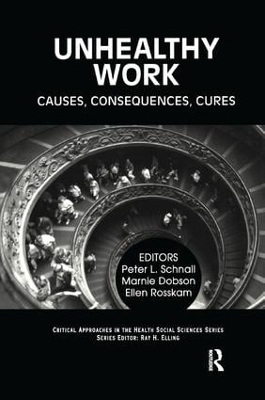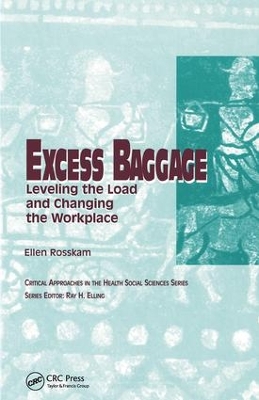Critical Approaches in the Health Social Sciences
2 total works
Unhealthy Work
by Peter L. Schnall, Marnie Dobson, Ellen Rosskam, and Ray H. Elling
Published 15 September 2009
Work, so fundamental to well-being, has its darker and more costly side. Work can adversely affect our health, well beyond the usual counts of injuries that we think of as 'occupational health'. The ways in which work is organized - its pace and intensity, degree of control over the work process, sense of justice, and employment security, among other things - can be as toxic to the health of workers as the chemicals in the air. These work characteristics can be detrimental not only to mental well-being but to physical health. Scientists refer to these features of work as 'hazards' of the 'psychosocial' work environment. One key pathway from the work environment to illness is through the mechanism of stress; thus we speak of 'stressors' in the work environment, or 'work stress'. This is in contrast to the popular psychological understandings of 'stress', which locate many of the problems with the individual rather than the environment. In this book we advance a social environmental understanding of the workplace and health. The book addresses this topic in three parts: the important changes taking place in the world of work in the context of the global economy (Part I); scientific findings on the effects of particular forms of work organization and work stressors on employees' health, 'unhealthy work' as a major public health problem, and estimates of costs to employers and society (Part II); and, case studies and various approaches to improve working conditions, prevent disease, and improve health (Part III).
Based on groundbreaking research on the working conditions of airport check-in workers in two countries, a previously unstudied category of predominantly women workers, Ellen Rosskam describes a form of work characterized as modern-day Taylorism. An occupation greatly affected by new forms of work organization and management practices-caught in the throes of rapid change due to international competition, alliances, mergers, and the application of cost-efficiency strategies-check-in work has been undermined in recent years by the adverse effects of liberalization and technological change.By peeling away the veneer of glamour associated with airport check-in work, Rosskam reveals how changes in work organization in this sector have de-skilled, disempowered, and ultimately demoralized workers. In "Excess Baggage", weaving through the psychological distress, physical pain from musculoskeletal disorders, strain, and violence that check-in workers experience and describe in their own words, a picture emerges of a job perceived to be "safe," "clean," "glamour girl" work, but which is comparable to industrial workplaces that require heavy manual lifting, obligingly performed in skirts, dresses, and pretty little shoes.

